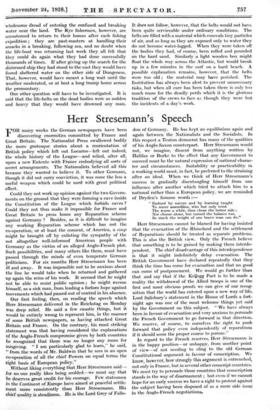Herr Stresemann's Speech
FOR many weeks the German newspapers have been discoveting enormities committed by France and Great Britain. The Nationalist Press swallowed bodily the more grotesque stories about a reorientation of British policy which left out Locarno--left out indeed, the whole history of the League—and relied, after all, upon a new Entente with France embodying all sorts of secret arrangements. The Nationalists believed all this because they wanted to believe it. To other Germans, though it did not carry conviction, it was none the less a useful weapon which could be used with great political effect.
Could they not work up opinion against the two Govern- ments on the ground that they were forming a cave inside the Constitution of the League which forbids caves ? Could they not thus make it impossible for France and Great Britain to press home any Reparation scheme against Germany ? Besides, as it is difficult to imagine any working Reparation scheme which has not the co-operation, or at least the consent, of America, a coup might be brought off by enlisting the sympathy of the not altogether well-informed American people with Germany as the victim of an alleged Anglo-French plot. Such possibilities, and many others like them, must have passed through the minds of even temperate German politicians. For six months Herr Stresemann has been ill and away. It was impossible not to be anxious about the line he would take when he returned and gathered up again the reins of his work. It seemed that he might not be able to resist public opinion ; he might excuse himself, as a sick man, from leading a forlorn hope against movements which had passed out of control in his absence.
Our first feeling, then, on reading the speech which Herr Stresemann delivered in the Reichstag on Monday was deep relief. He said a few caustic things, but it would be entirely wrong to represent him, in the manner of some British newspapers, as having attacked Great Britain and France. On the contrary, his most striking statement was that having considered the explanations of the Anglo-French compromise given by both countries he recognized that there was no longer any room for misgiving. " I am particularly glad to learn," he said, " from.the. words of Mr. Baldwin that he sees in an open co-operation of all the chief Powers on equal terms the right basis of European policy."
Without liking everything that Herr Stresemann said— fox no one .really likes being scolded-.--we must say that he deserves great credit for his courage. Few statesmen in the Continent of ;Europe have aimed at peaceful settle, went more consistently than Herr Stresemann. His chief quality is steadiness.. He is the Lord Grey of Fella- don of Germany. He has kept an equilibrium again and again between the Nationalists and the Socialists. In this respect a Teuton democrat has many of the qualities of his Anglo-Saxon counterpart. Herr Stresemann would not, we imagine, dissent from anything written by Halifax or Burke to the effect that any Government to succeed must be the natural expression of national charac- ter and circumstances. Suitability or practicability in a working world must, in fact, be preferred to the straining after an ideal. When we think of Herr Stresemann's success in gradually disentangling himself from one influence after another which tried to attach him to a national rather than a European policy, we are reminded of Dryden's famous words :- "Endued by nature and by learning taught To move assemblies, who but only tried The worse a while, then chose the better side ; Nor choose alone, but turned the balance too, So much the weight of one brave man can do."
Herr Stresemann cannot be blamed for having insisted that the evacuation of the Rhineland and the settlement of Reparations should be treated as separate problems. This is also the British view. Only the French believe that something is to be gained by making them interde- pendent. The chief disadvantage of this interdependence is that it might indefinitely delay evacuation. The British Government have declared repeatedly that they think the time has come for evacuation and that no good can come of postponement. We would go further than that and say that if the Kellogg Pact is to be made a reality the withdrawal of the Allied troops is one of the first and most obvious proofs we can give of our recog- nition that the world has entered upon a new way of life. Lord Salisbury's statement in the House of Lords a fort- night ago was one of the most welcome things yet said by the Government on this subject. " We have always been in favour of evacuation and very anxious to persuade the French Government to go forward in that direction. We reserve, of course, to ourselves the right to push forward that policy even independently of reparations if it should seem the proper course to pursue."
In regard to the French reserves, Herr Stresemann is in the happy position—or unhappy, from another point of view—of not needing to cling to the old German Constitutional argument in favour of conscription. We know, however, how strongly this argument is entrenched, not only in France, but in several other conscript countries.
We must try to persuade those countries that conscription stands in the way of disarmament ; but even if we cannot hope for an early success we have a right to protest against the subject having been disposed of as a mere side issue in the Anglo-French negotiations.


















































 Previous page
Previous page